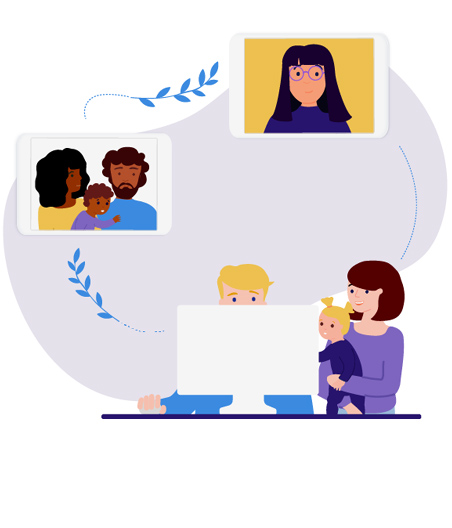1. The Best for Every Child
- All children deserve to have an equal chance of success.
- High-quality early education is good for all children. It is especially important for children from disadvantaged backgrounds.
- When they start school, children from disadvantaged backgrounds are, on average, 4 months behind their peers. We need to do more to narrow gap.
- Children who have lived through difficult experiences can begin to grow stronger when they experience high quality early education and care.
- High-quality early education and care is inclusive. Children’s special educational needs and disabilities (SEND) are identified quickly. All children promptly receive any extra help they need, so they can progress well in their learning.
2. High Quality Care
- The child’s experience must always be central to the thinking of every practitioner.
- Babies, toddlers and young children thrive when they are loved and well cared for.
- High-quality care is consistent. Every practitioner needs to enjoy spending time with young children.
- Effective practitioners are responsive to children and babies. They notice when a baby looks towards them and gurgles and respond with pleasure.
- Practitioners understand that toddlers are learning to be independent, so they will sometimes get frustrated.
- Practitioners know that starting school, and all the other transitions in the early years, are big steps for small children.
3. The Curriculum, What We Want Children to Learn
- The curriculum is a top-level plan of everything the early years setting wants the children to learn.
- Planning to help every child to develop their language is vital.
- The curriculum needs to be ambitious. Careful sequencing will help children to build their learning over time.
- Young children’s learning is often driven by their interests. Plans need to be flexible.
- Babies and young children do not develop in a fixed way. Their development is like a spider’s web with many strands, not a straight line.
- Depth in early learning is much more important than covering lots of things in a superficial way.
4. Ethos, Helping Children to Learn
- Children are powerful learners. Every child can make progress in their learning, with the right help.
- An effective ethos is a mix of different approaches. Children learn through play, by adults modelling, by observing each other, and through guided learning and direct teaching.
- Practitioners carefully organise enabling environments for high-quality play. Sometimes, they make time and space available for children to invent their own play. Sometimes, they join in to sensitively support and extend children’s learning.
- Children in the early years also learn through group work, when practitioners guide their learning.
- Older children need more of this guided learning.
- A well-planned learning environment, indoors and outside, is an important aspect of our ethos.
5. Assessment, Checking What Children have Learnt
- Assessment is about noticing what children can do and what they know. It is not about lots of data and evidence.
- Effective assessment requires practitioners to understand child development. Practitioners also need to be clear about what they want children to know and be able to do.
- Accurate assessment can highlight whether a child has a special educational need and needs extra help.
- Before assessing children, it’s a good idea to think about whether the assessments will be useful.
- Assessment should not take practitioners away from the children for long periods of time.
6. Self-Regulation & Effective Function
- Executive function includes the child’s ability to: – hold information in mind – focus their attention – think flexibly – inhibit impulsive behaviour.
- These abilities contribute to the child’s growing ability to self-regulate: – concentrate their thinking – plan what to do next – monitor what they are doing and adapt – regulate strong feelings – be patient for what they want – bounce back when things get difficult.
- Language development is central to self-regulation: children use language to guide their actions and plans. Pretend play gives many opportunities for children to focus their thinking, persist and plan ahead.
7. Partnership with Parents
- It is important for parents and early years settings to have a strong and respectful partnership. This sets the scene for children to thrive in the early years.
- This includes listening regularly to parents and giving parents clear information about their children’s progress.
- The help that parents give their children at home has a very significant impact on their learning.
- Some children get much less support for their learning at home than others. By knowing and understanding all the children and their families, settings can offer extra help to those who need it most.
- It is important to encourage all parents to chat, play and read with their children.
Enquiries
For more information and or enquiries on any of the ethos information listed on our website, please contact your local Granby Nursery, or make your enquiry via our Contact Form. Our practitioners are on hand to help deal with your enquiry and answer any questions you may have.
Parkgate, Rotherham
Telephone 01709 710709
parkgate@granbynurseries.co.uk
Wickersley, Rotherham
Telephone 01709 548008
wickersley@granbynurseries.co.uk
Carlton in Lindrick, Worksop
Telephone 01909 733833
carlton@granbynurseries.co.uk

A Dedication to Quality Childcare
We are constantly reflecting on our childcare facilities in the Rotherham and Worksop areas, and improving on our already high standards.
Past and present families are the best judges of nursery quality. All comments on our website are genuine.

We use FAMILY – The Number 1 Nursery Management Platform to strengthen parent partnerships through daily updates, instant messages and automatic reminders.

